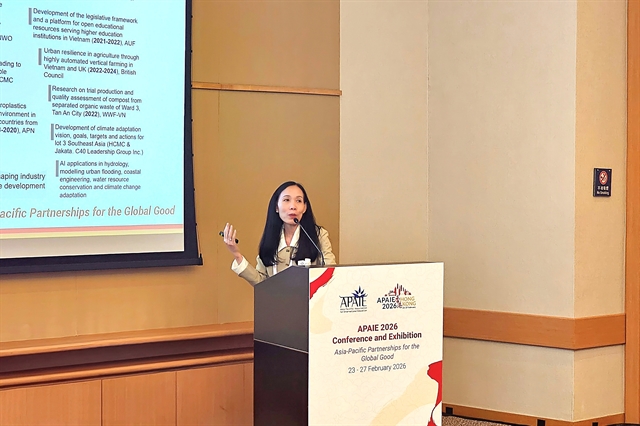 Business Beat
Business Beat

 |
| An FWD office in Đà Nẵng. FDW has raised the charter capital of FWD Vietnam to VNĐ19.1 trillion, affirming its commitment to long-term and sustainable development in the Vietnamese market. Photo FWD Vietnam. |
Compiled by Thu Hà
HÀ NỘI — After experiencing a rapid and strong growth cycle in the past decade, Việt Nam’s insurance industry is inevitably facing a correction and decline that requires insurers to focus on restructuring and improving service quality to meet the increasing demands of the market in the coming time.
The insurance industry posted an annual growth rate of up to 20-30 per cent over the past ten years, but revenue fell in the first half of this year.
According to the Vietnam Insurance Association, total insurance premium revenue from the entire insurance market in the first six months of 2023 was estimated at VNĐ112.7 trillion, down 4.6 per cent compared to the same period in 2022. Of this amount, premium revenue from non-life insurance reached VNĐ34.91 trillion, up 3.3 per cent, while life insurance revenue was VNĐ77.8 trillion, down 7.9 per cent over the same period last year.
Notably, the life insurance sector witnessed a sharp decline. The number of new contracts in the first six months of 2023 recorded a decrease of 31.3 per cent over the same period last year to just more than 1 million contracts, of which, investment-linked insurance products accounted for 61.2 per cent, down 34.4 per cent.
Total new life insurance premium revenue in the first half of this year reached about VNĐ15.5 trillion, down 38.2 per cent over the same period last year.
Despite the decline in revenue, life insurance companies recorded a sharp increase in insurance payments of up to VNĐ25.8 trillion in the first six months of this year, up 37.1 per cent over the same period last year. This was one of the main reasons why the business performance of many insurers was negative in the first half of this year.
Bancassurance, which has been one of the main distribution channels of the insurance industry in recent years, also recorded a sharp decline, which caused a reduction in non-interest income for most banks in the first half of this year.
For example, fee income from the insurance business and services of Military Bank, which is among the leaders in terms of revenue from the insurance business, reached only VNĐ4.19 trillion, down more than 17 per cent over the same period last year, according to the bank's semi-annual financial statements.
Techcombank also only recorded fees from insurance services of VNĐ290 billion in H1 2023, down 53 per cent compared to the same period last year. This value for VIB and Sacombank was VNĐ315 billion and VNĐ459 billion, down 46 per cent and nearly 24 per cent, respectively.
The decline of the insurance industry was attributed to many reasons, but shortcomings and inadequacies in service that culminated in a confidence crisis in the first quarter of 2023 was believed to be the main reason for the sharp decline of the industry in the first half of this year. Bancassurance came under severe criticism due to instances of fraud and coercion. Customers have particularly raised concerns about the confusion between high-interest savings accounts and life insurance. Borrowers have also complained about being forced to purchase life insurance along with their bank loans.
In addition, the decline of the insurance industry in the first half of this year was also due to the economic slowdown. This is also a reason that may prolong the decline of the insurance industry into the second half of 2023, and even into next year.
New faces
After the recent crisis in confidence, a number of leading insurance companies, such as Prudential and Manulife, have decided to restructure and improve service quality. The insurers aim to bring a ‘new breeze’ to the insurance business in the Vietnamese market. All new personnel will have experience in the insurance industry and understanding of the local market.
According to Anantharaman Sridharan, new general director of FDW Vietnam, Việt Nam is a dynamic market in Asia. As a result, FDW will continue to bring simple, easy-to-understand products and services powered by digital technology to more Vietnamese people, thereby continuing to change the perception of local people about insurance products. Notably, FDW has continued to increase investment and raised the charter capital of FWD Vietnam to VNĐ19.1 trillion, which affirms its commitment to long-term and sustainable development in the Vietnamese market.
At Manulife, the company has also invested more than US$1 billion in the Vietnamese market. After the recent confidence crisis, Manulife has focused on restructuring and changing its business strategy in order to improve the quality of consulting services.
A representative of Manulife said the company is currently focusing on implementing a transparent insurance strategy, which starts with all customers buying new products of the company to be fully consulted. The consultations will be recorded and videotaped, and products will be clearly explained to customers. This helps customers understand the product before deciding to sign any contracts.
In addition, Manulife is also focusing on digitising insurance services and improving the quality of its customer service experience.
Not only insurance companies, but also banks - the main partners of the insurance industry - have recently been prioritising restructuring distribution activities and improving consulting services.
Techcombank has implemented a customer relationship management platform after launching iTCBlife, a demand analysis tool, in June last year. Techcombank has also set up an insurance hotline to deal with all customer queries.
According to Nguyễn Anh Tuấn, Deputy Director of Techcombank's Retail Banking Division, 2023 is a year that Techcombank will invest the most in bancassurance. Techcombank has so far cooperated with a partner to re-establish the entire consulting process based on customer needs. Simultaneously, the bank is also focusing on digitising services to expand online channels for customers to fully access services.
Although the insurance market is facing many difficulties, Techcombank expects its bancassurance segment will recover in the near future thanks to these measures, as surveys show insurance is a growing need of customers. This is an opportunity for the bank to increase non-interest income in 2023, Tuấn said.
Besides the restructuring efforts of the insurers, the insurance business is expected to improve transparency as shortcomings and inadequacies in the market will be addressed under the Law on Insurance Business 2022, which took effect earlier this year. Currently, the insurance industry is waiting for legal guidance to have a basis for implementation of the law. — VNS




